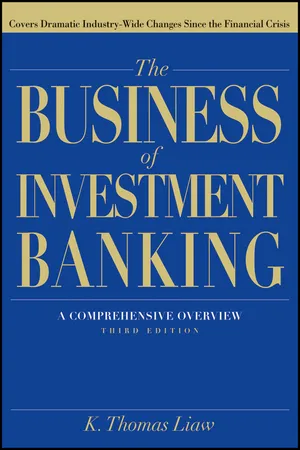
The Business of Investment Banking
A Comprehensive Overview
K. Thomas Liaw
- English
- ePUB (mobile friendly)
- Available on iOS & Android
The Business of Investment Banking
A Comprehensive Overview
K. Thomas Liaw
About This Book
A comprehensive overview of investment banking for professionals and students
The investment banking industry has changed dramatically since the 2008 financial crisis. Three of the top five investment banks in the United States have disappeared, while Goldman Sachs and Morgan Stanley have converted to commercial banking charters. This Third Edition of The Business of Investment Banking explains the changes and discusses new opportunities for students and professionals seeking to advance their careers in this intensely competitive field.
The recent financial regulation overhaul, including the Dodd-Frank legislation, is changing what investment banks do and how they do it, while the Volcker rule has shaken up trading desks everywhere.
- This new edition updates investment banking industry shifts in practices, trends, regulations, and statistics
- Includes new chapters on investment banking in BRIC countries, as Brazil, Russia, India, and China now account for a quarter of the global economy
- Explains the shift in the listing of securities away from New York to various financial centers around the world, and how major exchanges compete for the same business
This new edition, reflecting the current state of the investment banking industry, arrives in time to better serve professionals wanting to advance their careers and students just beginning theirs.
Frequently asked questions
CHAPTER 1
INTRODUCTION TO INVESTMENT BANKING: HOW THE FINANCIAL CRISIS AND REFORMS CHANGED THE INDUSTRY
THE NEW INVESTMENT BANKING
Investment Banking Business
Other Securities Businesses
CAUSES OF THE FINANCIAL CRISIS
- This financial crisis was avoidable. The crisis was the result of human action and inaction. The captains of finance and the public stewards of our financial system ignored warnings and failed to question, understand, and manage evolving risks within a system essential to the well-being of the American public.
- There were widespread failures in financial regulation and supervision that proved devastating to the stability of the nation's financial markets.
- Dramatic failures of corporate governance and risk management at many systemically important financial institutions were a key cause of this crisis. There was a view that instincts for self-preservation inside major financial firms would shield them from fatal risk-taking without the need for a steady regulatory hand, which, the firms argued, would stifle innovation. Too many of these institutions acted recklessly, taking on too much risk, with too little capital, and with too much dependence on short-term funding.
- A combination of excessive borrowing, risky investments, and lack of transparency put the financial system on a collision course with crisis. Clearly, this vulnerability was related to failures of corporate governance and regulation, but it is significant enough by itself to warrant our attention here.
- The government was ill prepared for the crisis, and its inconsistent response added to the uncertainty and panic in the financial markets. As part of our charge, it was appropriate to review government actions taken in response to the developing crisis, not just those policies or actions that preceded it, to determine if any of those responses contributed to or exacerbated the crisis.
- There was a systemic breakdown in accountability and ethics. The integrity of our financial markets and the public's trust in those markets are essential to the economic well-being of our nation. The soundness and the sustained prosperity of the financial system and our economy rely on the notions of fair dealing, responsibility, and transparency. In our economy, we expect businesses and individuals to pursue profits, at the same time that they produce products and services of quality and conduct themselves properly.
- Collapsing mortgage-lending standards and the mortgage securitization pipeline lit and spread the flame of contagion and crisis. When housing prices fell and mortgage borrowers defaulted, the lights began to dim on Wall Street. This report catalogues the corrosion of mortgage-lending standards and the securitization pipeline that transported toxic mortgages from neighborhoods across America to investors around the globe.
- Over-the-counter derivatives contributed significantly to this crisis. The enactment of legislation in 2000 to ban the regulation by both the federal and state governments of over-the-counter (OTC) derivatives was a key turning point in the march toward the financial crisis.
- The failures of credit rating agencies were essential cogs in the wheel of financial destruction. The three credit rating agencies were key enablers of the financial meltdown. The mortgage-related securities at the heart of the crisis could not have been marketed and sold without their seals of approval. Investors relied on them, often blindly. In some cases, investors were obligated to use them, or regulatory capital standards were hing...